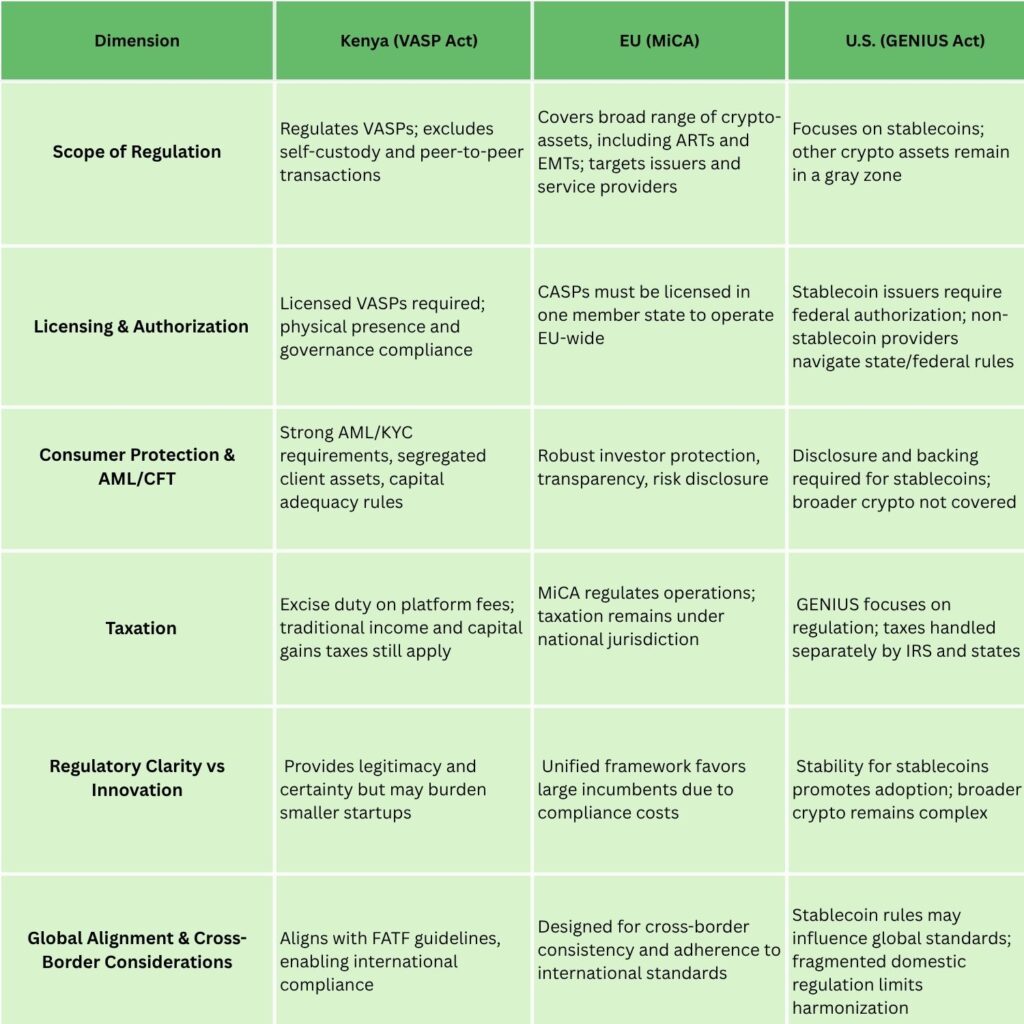
Introduction
The global cryptocurrency landscape is evolving at a breakneck pace, and governments worldwide are racing to regulate this once-anarchic market. From the European Union to the United States and now Kenya, regulators are introducing legal frameworks designed to protect consumers, ensure financial stability, and foster innovation.
Among these, three stand out: Kenya’s Virtual Asset Service Providers Act (VASP Act), the European Union’s Markets in Crypto-Assets Regulation (MiCA), and the United States’ Guiding and Establishing National Innovation for U.S. Stablecoins Act (GENIUS Act)
Kenya’s VASP Act marks a significant shift from the country’s previously gray legal stance on cryptocurrencies. MiCA represents the EU’s ambitious effort to unify regulations across 27 member states. And, the GENIUS Act in the U.S. focuses primarily on stablecoins but signals the federal government’s increasing attention to the broader crypto ecosystem.
This article compares these regulatory frameworks, examining their scope, licensing requirements, consumer protections, taxation, and impact on innovation. By exploring similarities, differences, and potential implications for the Kenyan crypto industry, we aim to provide a comprehensive understanding of where Kenya stands in the global regulatory landscape.
Overview of Each Regulatory Regime
Before diving into the comparative analysis, it’s important to understand the scope and focus of each crypto regulation framework. Kenya’s VASP Act, the EU’s MiCA, and the U.S. GENIUS Act stablecoin regulation each take a distinct approach to crypto oversight, shaped by their domestic priorities, market size, and regulatory philosophy.
Examining these regimes individually provides context for their similarities, differences, and implications for both local and international virtual asset service providers (VASPs).
Kenya – VASP Act
The Virtual Asset Service Providers Act (VASP Act), assented in 2025, formally regulates virtual asset service providers in Kenya, including cryptocurrency exchanges, custodial wallets, and token issuers. Under the Act, the Central Bank of Kenya (CBK) and the Capital Markets Authority (CMA) jointly oversee licensing, compliance, and enforcement.
Key obligations under the VASP Act include:
- Licensing Requirements: All Virtual Asset Service Providers (VASPs) must obtain a license to operate legally in Kenya. Licenses require proof of capital adequacy, insurance coverage, and a physical office in the country. This framework reinforces crypto investor protection while promoting confidence in licensed operators.
-
- Governance and Fitness: Directors and key personnel must meet “fit and proper” standards. This ensures that individuals responsible for digital asset operations are capable, trustworthy, and accountable, reducing the risk of mismanagement or fraud.
-
- AML/KYC Compliance: Providers must implement anti-money laundering (AML) and know-your-customer (KYC) protocols. Compliance with AML/KYC standards not only prevents illicit activities but also aligns Kenya’s crypto regulation with international standards, enhancing its credibility on the global stage.
To help businesses meet these stringent obligations, compliance-first API providers like YoguPay integrate automated KYC and transaction monitoring features into its API ecosystem. This allows regulated entities to embed real-time identity verification, sanctions screening, and risk scoring directly into their crypto and cross-border workflows.
- Scope of Regulation: The Act primarily targets crypto service providers rather than individual users because peer-to-peer transactions and self-custody wallets remain largely unregulated; a common gap in crypto regulation in Africa. This approach balances oversight with user freedom, while leaving certain areas of the market in a gray zone that may require future regulatory attention.
-
- Tax Implications: Kenya has shifted from a broad digital asset tax to an excise duty on platform fees, while traditional income and capital gains taxes still apply. This approach simplifies compliance and integrates digital asset taxation into the national revenue framework.
The VASP Act addresses Kenya’s long-standing need for regulatory clarity, providing legitimacy to the crypto sector while imposing compliance costs on operators. It also aligns with international standards such as the Financial Action Task Force (FATF) recommendations.
Within this evolving landscape, providers like YoguPay are building compliant financial infrastructure that bridges digital assets and traditional finance. Through its API-driven payment rails and secure wallet technology, YoguPay enables fintechs and VASPs to operate confidently under Kenya’s VASP Act while maintaining global interoperability.

European Union – MiCA
The Markets in Crypto-Assets Regulation (MiCA) is the EU’s comprehensive regulatory framework for crypto-assets not covered by existing financial services laws. MiCA regulation aims to unify crypto regulation across member states, ensuring transparency, investor protection, and market stability.
The MiCA regulation covers:
- Crypto-Asset Service Providers (CASPs): MiCA requires that all exchanges, wallet providers, and other crypto service providers obtain a license to operate across the European Union. Licensing ensures that these entities meet strict operational, governance, and financial standards, providing a consistent regulatory framework across member states and promoting crypto investor protection and confidence.
-
- Token Issuers: The regulation also applies to issuers of asset-referenced tokens (ARTs) and e-money tokens (EMTs), mandating disclosure of key information and formal authorization before digital asset issuance.
-
- Consumer Protections: MiCA emphasizes clear, accessible information for consumers; where firms must communicate risks, costs, and user rights in a transparent manner. This helps prevent mis-selling, enhances trust in the crypto ecosystem, and aligns digital asset offerings with broader EU consumer protection standards.
-
- Financial Stability Measures: Large token issuers face additional requirements designed to safeguard financial stability and prevent systemic risks. These include governance standards, capital and liquidity requirements, and contingency planning, ensuring that major market players operate responsibly and do not threaten the broader financial system.
MiCA was formally adopted in May 2023, with full implementation in December 2024. Its cross-border design allows licensed CASPs to operate across the EU without obtaining separate national licenses. MiCA also introduces environmental disclosure requirements, reflecting the EU’s commitment to sustainability.
While comprehensive, MiCA’s complexity may challenge smaller firms due to high compliance costs. Nevertheless, it represents a robust framework for integrating crypto assets into a regulated financial system.

United States – GENIUS Act
The GENIUS Act primarily addresses the regulation of stablecoins in the United States, offering federal clarity to an area previously governed by fragmented state and federal oversight. The Act, passed by the Senate in June 2025, mandates:
- Full Reserve Backing: The GENIUS Act mandates that all stablecoins be fully backed on a 1:1 basis, either by U.S. dollars or by short- and long-term U.S. Treasury assets. This ensures that each token can be redeemed at its stated value at any time, mitigating the risk of sudden collapses and protecting users from losses caused by under-collateralization or mismanagement of assets.
-
- Disclosure and Reporting: Stablecoin issuers must provide transparent reporting on their reserves, financial health, and operational practices. Regular audits and public disclosures enhance accountability, allowing regulators, investors, and users to assess the stability and reliability of each issuer.
-
- Consumer Protection: The Act is designed to safeguard consumers from risks commonly associated with stablecoin failures, including fraud, liquidity crises, and operational mismanagement. By establishing clear regulatory expectations, the GENIUS Act promotes confidence in stablecoins as a secure and reliable form of digital currency.
Unlike MiCA, the GENIUS Act focuses narrowly on stablecoins rather than the broader cryptocurrency universe. Its primary significance lies in establishing federal oversight, which could set a benchmark for other crypto regulations in the U.S. and globally.
While offering clarity for stablecoin issuers, the GENIUS Act leaves other segments of the U.S. crypto market; like decentralized finance (DeFi) protocols and non-stablecoin tokens under existing laws enforced by the SEC, CFTC, and various state regulators.

Comparative Framework: Key Dimensions
To understand how Kenya’s VASP Act compares globally, it helps to evaluate key regulatory dimensions with the EU’s MiCA regulation and the U.S. GENIUS Act. These frameworks differ in their scope of crypto assets, licensing and authorization requirements, crypto investor protection, and cross-border compliance mechanisms. Examining these dimensions highlights both Kenya’s progress and the opportunities for growth and refinement in its crypto regulatory framework.
Regulatory Scope and Asset Coverage
Kenya’s VASP Act focuses on service providers, covering virtual assets used for payment or investment but not regulating every type of token individually.
MiCA takes a broad, all-encompassing approach, classifying crypto-assets, stablecoins, and token issuers under a single framework. In contrast, The GENIUS Act is narrowly scoped, concentrating on payment stablecoins. These include; Tether (USDT), USD Coin (USDC), Ethena USDe (USDe), Dai (DAI), PayPal USD (PYUSD), and TrueUSD (TUSD).
These differences influence regulatory complexity, innovation potential, and market accessibility. Kenya’s targeted approach reduces administrative burden but may leave some risks unaddressed. The EU’s extensive coverage enhances investor protection but can impose significant compliance costs. The U.S. approach prioritizes systemic stability but may constrain broader crypto innovation beyond payment-focused assets.
Licensing and Service-Provider Obligations
Kenya requires VASPs to obtain licenses, establish a local presence, meet capital requirements, and adhere to governance standards. MiCA mandates authorization for both issuers and service providers, including passporting rights for cross-border operations, and emphasizes transparency and reserve maintenance.
The U.S Stablecoin Act restricts issuance to qualified, highly capitalized entities, often banks or regulated non-bank institutions, ensuring stability but creating high entry barriers for smaller players.
Reserve Backing, Asset Protection, and Redemption Rights
Reserve management varies significantly. The VASP Act does not prescribe detailed 1:1 backing for stablecoins, instead focusing on service-provider solvency. MiCA mandates reserve for certain tokens but allows some flexibility, excluding unbacked algorithmic stablecoins.
The GENIUS requires strict 1:1 backing with liquid assets and enforceable redemption rights, offering maximum consumer protection.
In this context, Kenya provides foundational safeguards, the EU balances risk and innovation, and the U.S. prioritizes full protection and stability, potentially at the expense of smaller issuers.
AML/CFT and Consumer Protection
All three frameworks integrate AML/CFT obligations. Kenya emphasizes KYC protocols, suspicious transaction reporting, and compliance with international standards. Similarly, MiCA enforces disclosure and marketing rules, with AML oversight partially delegated to member states.
The GENIUS incorporates AML/CFT obligations, redemption rights, and freezing mechanisms to protect consumers and the financial system. While Kenya’s alignment with global standards enhances credibility, enforcement capacity remains a critical factor.
Infrastructure partners like YoguPay are reinforcing these safeguards through secure data handling, multi-party computation, and transparent transaction design. Such systems enhance consumer protection by ensuring funds remain verifiable, tamper-resistant, and compliant with both AML/CFT and data protection obligations.
Innovation and Market Growth vs Regulatory Constraints
Kenya aims to position itself as a regional fintech hub, providing legal clarity to attract investment while maintaining market integrity. MiCA seeks to unify the European crypto market, facilitating innovation but potentially imposing high compliance costs on smaller players.
The U.S stablecoin rule offers stability and legal clarity in the American market, but may constrain broader crypto experimentation. Therefore, regulatory frameworks must balance market growth, innovation, and risk management, considering each jurisdiction prioritizes differently.
Global Alignment and Cross-Border Implications
MiCA sets a benchmark for global regulatory standards, influencing other jurisdictions, whereas the GENIUS Act aims to reinforce the U.S. dollar’s dominance and create a stable payment infrastructure. By establishing a regulated framework, Kenya positions itself as a gateway for Africa, particularly leveraging mobile-money integration.
Cross-border coordination and regulatory harmonization are critical, particularly in Africa, where remittances and fintech play a major role in financial inclusion.
As Kenya aligns its frameworks with global standards such as MiCA and the GENIUS Act, cross-border payment enablers like YoguPay are helping bridge regulatory and operational gaps. Their interoperable infrastructure supports compliant value transfer across jurisdictions, positioning Kenya’s fintech ecosystem to compete confidently on a global scale.
Taxation
Tax treatment of digital assets varies significantly across jurisdictions, adding complexity to regulatory compliance. In Kenya, the taxation authority replaced the initial 3% tax on digital assets with a 10% excise duty on transaction fees, applied to VASPs. Peer-to-peer transfers, however, remain largely untaxed, offering some clarity while leaving certain gaps in the regulatory framework.
MiCA does not directly dictate tax regimes, leaving it to individual EU member states, which may impose VAT, capital gains, or income taxes on crypto transactions. Correspondingly, the U.S. GENIUS does not alter existing IRS guidance, meaning stablecoin transactions are subject to capital gains taxation or ordinary income rules depending on context.
For firms and investors, understanding these tax obligations is critical for financial planning, cross-border operations, and compliance strategy.

Implications for Kenya and Local Industry
As Kenya moves to formalize its virtual assets ecosystem, the VASP Act is poised to reshape how local operators engage with the market. By establishing clear rules and governance structures, the legislation sets the stage for both opportunities and challenges, influencing investment, innovation, and operational practices across the sector.
With the maturation of these regulatory approaches, technology partners such as YoguPay are helping businesses adapt to the new compliance landscape. By providing secure APIs, digital wallet infrastructure, and cross-border payment rails, YoguPay enables VASPs and fintechs to operate seamlessly under Kenya’s emerging regulatory framework.
Strengths
Kenya’s VASP Act provides legal clarity, promoting investor confidence and weeding out unlicensed operators. It aligns with international AML/CFT standards and sets the foundation for Kenya to become a regional fintech hub, leveraging its robust mobile-money ecosystem.
The dual-regulator model ensures specialized oversight for payments and investment activities, enhancing market stability. This alignment of clarity and innovation creates room for compliant fintech enablers like YoguPay, whose infrastructure supports safe, transparent, and regulation-ready crypto transactions across borders.
Potential Challenges
Implementation remains a significant challenge; the effectiveness of the framework will depend on regulatory capacity, consistent enforcement, and clear guidance on complex provisions. Compliance costs may deter smaller startups, potentially consolidating the market among larger players.
In addition, the absence of explicit stablecoin reserve requirements leaves certain risks unaddressed, and self-custody activities remain largely unregulated.
Comparison with Global Frameworks
Kenya is ahead in establishing a formal legal framework in Africa, but compared to MiCA and GENIUS, gaps exist in stablecoin backing, cross-border harmonization, and broad asset coverage. While the VASP Act provides foundational clarity, additional measures may be needed to match international best practices.
Lessons from EU and U.S. Frameworks
From the GENIUS Act, Kenya could adopt strict reserve backing and redemption rights for stablecoins. From MiCA, the country could consider broader asset categorization, cross-border harmonization, and market passporting mechanisms.
Implementing sandbox environments could further balance innovation with regulatory oversight.
Global Learning from Kenya
With the CBK and CMA jointly overseeing the VASP Act, Kenya exemplifies how dual-regulator models and customized licensing frameworks can foster innovation while safeguarding consumers in emerging markets. Its integration with mobile-money infrastructure highlights unique approaches to financial inclusion and cross-border remittances, providing insights for other developing jurisdictions.
Sectoral Impacts
Crypto exchanges, token issuers, and wallet providers will need to strengthen governance, AML systems, and risk management to comply with the VASP Act. Artists and creators tokenizing their work, as well as fintech startups, can benefit from increased legitimacy and investor confidence if they align early, gaining a competitive advantage in the regulated market.
By implementing these measures, Kenya has the potential to position itself as a crypto hub in Africa, attracting innovation while maintaining investor protection.
Platforms like YoguPay are positioned to help exchanges, wallet providers, and creators integrate compliant rails that support tokenized payments, remittances, and NFT transactions while maintaining adherence to the VASP Act.

Narrative and Analysis
Globally, the trend is shifting from the unregulated crypto market toward structured regulation. The GENIUS Act stablecoin framework, MiCA regulation, and the Kenya VASP Act illustrate this evolution. Kenya’s approach represents a proactive attempt to formalize crypto operations, ensuring legitimacy while managing risk.
While regulation reinforces trust and legal certainty, it also introduces operational challenges and can slow innovation. Smaller operators may struggle, while large players gain advantage.
For Kenya, this is a chance to balance innovation and investor protection, learning from international counterparts.
- Global Competitiveness: Clear, predictable regulation positions Kenyan firms to engage with international markets, form cross-border partnerships, and attract foreign investment, particularly in Africa’s rapidly growing fintech ecosystem.
-
- Comparative Ambition: MiCA sets a comprehensive, cross-border benchmark in Europe, while the GENIUS Ac exerts outsized influence through the U.S. stablecoin market; Kenya’s VASP Act is foundational, aligned with global standards, and designed to catalyze regional growth.
-
- Future Outlook: Kenya’s crypto policy may expand its scope to encompass token issuers, decentralized finance (DeFi) regulation, and emerging digital assets. Simultaneously, the EU will implement secondary measures under MiCA, and the U.S. may broaden crypto oversight beyond payment stablecoins. Over time, global standardization could emerge, offering compliant firms worldwide new opportunities for expansion and collaboration.
As global compliance frameworks converge, YoguPay’s API-driven infrastructure can serve as a bridge for African businesses expanding beyond borders, offering interoperability with global standards like MiCA and GENIUS while retaining local regulatory alignment.
For creators, fintech startups, and investors, regulatory clarity offers a secure foundation, enabling tokenized projects, cross-border payments, and broader participation in digital asset markets. Agility, strategic compliance, and early adoption will be critical for capitalizing on these opportunities while navigating an increasingly structured global crypto ecosystem.

Conclusion
Kenya’s VASP Act, the EU’s MiCA, and the U.S. GENIUS Act each represent distinct approaches to regulating crypto. For Kenya, the VASP Act signals a commitment to responsible innovation and investor protection. Its successful implementation could position the country as a regional leader in crypto regulation. In an evolving crypto landscape, regulation is no longer optional. Kenya’s proactive stance creates opportunities for fintech startups, artists, and investors willing to adapt.
YoguPay stands at the intersection of compliance and innovation; offering secure APIs and cross-border payment rails built to help businesses scale in an increasingly tokenized economy. By aligning with emerging standards and regulatory frameworks, YoguPay empowers enterprises to participate confidently in Kenya’s regulated digital finance future.
To learn more about how YoguPay can help your business stay compliant and scale globally, visit www.yogupay.com or contact us today.